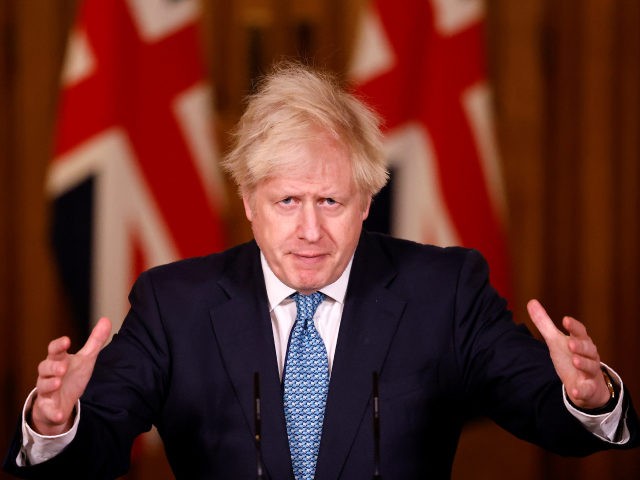Prime Minister Boris Johnson announced a third national lockdown across England, but refused to give a firm end date of the restrictions. He suggested a soft date to exit the lockdown in late February, but only “if things go well”.
Speaking to the public in a televised address from Downing Street on Monday night, Prime Minister Johnson put the whole of England effectively under house arrest, banning leaving home for all but essential reasons, blaming the new variant of the Chinese coronavirus for the lockdown.
“With most of the country under extreme measures, it’s clear we need to do more together to bring this new variant under control while our vaccines are rolled out. In England, we must therefore go under a national lockdown tough enough to contain this variant,” Prime Minister Johnson said.
Mr Johnson outlined that people living in England would be instructed to stay at home, allowed to leave only for “limited reasons permitted in law”, such as shopping for essentials, work if it cannot be done from home, for medical purposes, exercise, or to escape domestic abuse — similar to instructions First Minister Nicola Sturgeon gave to Scots earlier today.
Mr Johnson said that people should act on the measures effective immediately, but that the law will not become official until Parliament votes on the measures on Wednesday.
Schools and universities would be closed, while nurseries would remain open. The vulnerable have also been asked to shield.
However, Prime Minister Boris Johnson would not commit to a date whereby the restrictions would be lifted, saying that pending virus mortality falling and the successful widespread rollout of the vaccines, the lockdown would be in place until at least late February.
“By the middle of February, if things go well, and with the wind in our sails, we expect to have offered the vaccine to everyone in the four top priority groups identified by the joint committee on immunisation and vaccination,” meaning everyone over 70, all frontline health and social care workers, those in care homes, and those who are clinically vulnerable.
“Even if we achieve this goal” there is a time lag of two to three weeks until immunity, he said, “and there will be a further time lag before the pressure on the NHS is lifted”.
“So we should remain cautious about the timetable ahead.”
Prime Minister Johnson said: “If our understanding of the virus doesn’t change, if the roll out of the vaccine programmes continues to be successful, if deaths start to fall as the vaccine takes effect, and critically if everyone plays their part by following the rules, then I hope that we can steadily move out of lockdown.”
Mr Johnson said that after February half-term, in the latter end of the month, schools might reopen and regions may begin to move down in tiers.
Responding to the new lockdown, Brexit leader Nigel Farage said: “Lockdown till March is too depressing for words.”
While actor and culture wars activist Laurence Fox remarked: “Boris Johnson just announced that we are entering a state of lockdown. Not a period of lockdown. A state. That feels like a significant development.”

COMMENTS
Please let us know if you're having issues with commenting.